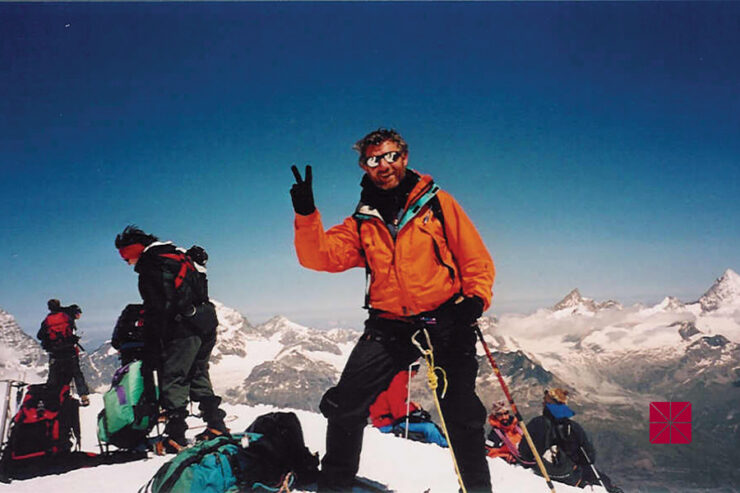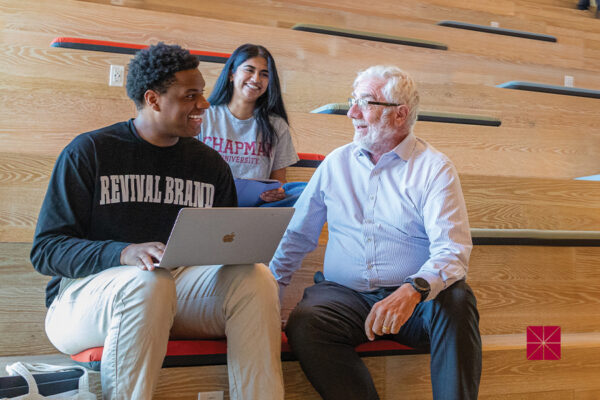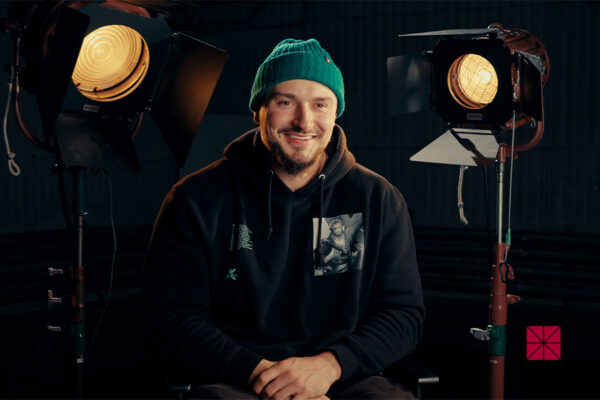Daniele Struppa was 22,000 feet up the Himalayan mountain Cho Oyu, the “Turquoise Goddess,” when fluid began to fill his lungs. Pulmonary edema is a common affliction at high altitude but no less dangerous for it. Summiting the sixth-largest mountain in the world would have to wait.
Struppa was forced to turn back and was led down the mountain by a Tibetan sherpa. Without a shared language, they made their way in silence, carefully walking down the pale-green, glaciated terrain for which the mountain gets its nickname. Struppa coughing, chest pain, tightness in the cold.
They passed Chinese soldiers patrolling the mountain for Tibetans attempting to cross the border into Nepal—an indicator of centuries-long political turmoil and religious persecution. But on that day, the conflict didn’t seem to matter so much on the mountain. Tired but feeling relief from the lower altitude, Struppa sat down with the sherpa and one of the soldiers and reached into his backpack for some chocolate, sharing it with them. A language apart, the men sat together and shared a brief moment above the world.
“That really to me is why mountains are so profound,” Struppa said. “You engage with a completely different world. It makes you humble. It makes you scared. But experiencing it all through the lens of being curious, it’s all beautiful.”
Struppa did not reach the summit that day—the highest mountaintop he “failed” to reach. But that wasn’t really the point anyway. He learned about pain, fear and the common goodness of people.
How to Stay Engaged
Climbing the world’s tallest mountains isn’t a typical hobby for university presidents, mathematicians or any regularly functioning human approaching 70 years old. But Struppa has a method to his madness—one of those commonly conveyed beliefs that everybody has heard but almost nobody takes advantage of.
Here it is: Be curious.
Struppa has spent decades rising up the ranks as an educator and renowned mathematician. But he is just as much a student today as he was when he discovered his passion for learning as a young child. He still craves the excitement of discovery. Curiosity has led him up the European Alps, the Caucasus Mountains between Asia and Europe, and the Andes in South America, where he proposed to his wife Lisa Sparks on Cotopaxi, an active volcano.
“In my view, curiosity really is the gift of education,” Struppa said. “I have the exact same drive to figure out new things as when I was a child. Your education will allow you to get a job and pay your mortgage—those are important. But the real reason for education is it instills a curiosity that protects you from getting old and wary of the world. You will stay engaged and excited. I really can’t wait to fully absorb myself in all of these practices after I leave the office and have more time to pursue them.”
As Struppa looks ahead to life after the presidency, he’s planning to focus on academic and physical pursuits. There will be mountain climbing, of course, but he’ll also focus on teaching, writing and learning Arabic. Every morning around 7 a.m., Struppa practices the language so he can eventually read ancient mathematics texts in their original form. He’s also writing a book about how the ideas of Plato influenced the work of Johannes Kepler, the 17th-century astronomer who figured out the laws of planetary motion.
The point Struppa finds so interesting in this account is that Plato’s ideas had nothing to do with the topic Kepler was concerned with.
“It’s a very strange story of the wrong idea in the right hands leading to this amazing discovery,” Struppa said. “It’s another example of the reasons to be curious. You never really know the value of something you learn right away—you can’t discredit anything.”
Bringing the Mountain Into the Classroom
As he departs his leadership position at Chapman, Struppa’s most sincere hope is that he has helped convey to students that curiosity can provide a foundation for a good life, filled with an unquenchable interest in all the mysterious complexity around them.
“What I would like every student to feel is ‘Wow, there’s so much stuff to learn,’” Struppa said. “You don’t have a lot of time here, but you try to read this and experience that and talk to this person and that person—it’s all interesting and everybody has a story. That’s the real value of education and what I would like to leave people with.”
When guided by curiosity, you adopt a beginner’s mind—perpetually in awe of the world around you, even the seemingly mundane. Despite massive success throughout his career, Struppa has always remained humble, because his curiosity has led him to seek out experiences that fortify that humility. It was on a mountain that Struppa learned how to be a better university president.
“My job is one that can breed arrogance because you’re the boss, you’re in charge,” Struppa said. “But the mountain teaches you that you’re very small and you could die at any moment. You have to rely on people who are much stronger than you, and you learn it’s okay that somebody is better than you at something.”
These enlightening experiences haven’t just impacted how Struppa functions as a president—he’s brought these lessons into the classroom.
Similarly to how he speaks about mountains, Struppa describes mathematical puzzles and equations as “beautiful.” And this beauty isn’t lost in not being able to solve them—just as his Himalayan venture was no less beautiful despite the “failure” and illness. In his teaching, Struppa often presents students with a nearly unsolvable problem. The lesson isn’t necessarily to find the answer. Students are eager to solve the unsolvable equation. Struppa has a real passion for seeing the light of creativity in each of his students’ eyes as they discover the value of curiosity while learning about their own capabilities—and the “beauty” of mathematics.
“Even though you may not be able to solve it, it is still very beautiful,” Struppa said. “Because the beauty is in the mystery, what isn’t yet known, and in the passion of the student trying to figure out the equation. I hope that every student ultimately gets to this point where they are guided by curiosity. When when they get old, they won’t be alone and thinking, what am I going to do?”
Infinite Mountain
There are two rooms in the presidential office at Chapman. One side is formal—accolades on the walls, something akin to the “Oval Office.” But the other room in Struppa’s office is far more like a classroom.
Struppa was sitting in that room on a recent afternoon, engaged in a discussion with some colleagues. Clad in an informal black t-shirt and jeans, he leaned back in his chair, considering all topics with equal interest. Books with obscure titles, coffee mugs and papers were strewn about a long table. Whiteboards were covered in Arabic calligraphy and enigmatic mathematical equations.
As can happen in a conversation with Struppa, the discussion veered into many topics, all compelling. He talked about mountains, the nature of the universe and good wine. But mostly, he talked about people. In particular, he spoke about a good friend—someone who made a mark on him.
“I have this good friend, a superb mathematician, one of the best of the century,” he said, eyes soft with reverence. “He worked all of his life on this mathematical function. He told me that he worked all of his life to understand this function. But he couldn’t quite do it.”
Shifting forward in his chair.
“But this wasn’t a problem for him,” Struppa said. “Because he had enjoyed each moment working to understand the mystery. I think, maybe that doesn’t sound so bad. Not being so focused on the answer.”
A warm gaze, considering the image in his mind.
“Life is really like an infinite mountain,” he said. “You don’t get to the summit. The more you learn, the more you realize you don’t know. But you can enjoy the journey up and all the things you find along the way. I like that, that’s beautiful.”
Refocusing, back to reality. A slight smile.
Cho Oyu in the offing…




